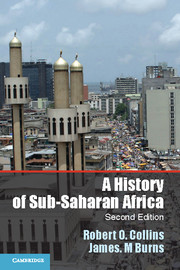Book contents
- Frontmatter
- Dedication
- Contents
- Acknowledgments
- Introduction
- Part I Foundations
- Part II Africa in World History
- Part III Imperial Africa
- Part IV Independent Africa
- 22 Nationalism and the independence of colonial Africa
- 23 The Union of South Africa and the apartheid state
- 24 A decade of hope
- 25 Cold War Africa
- 26 Africa at the beginning of the twenty-first century
- Index
- References
25 - Cold War Africa
Published online by Cambridge University Press: 05 June 2014
- Frontmatter
- Dedication
- Contents
- Acknowledgments
- Introduction
- Part I Foundations
- Part II Africa in World History
- Part III Imperial Africa
- Part IV Independent Africa
- 22 Nationalism and the independence of colonial Africa
- 23 The Union of South Africa and the apartheid state
- 24 A decade of hope
- 25 Cold War Africa
- 26 Africa at the beginning of the twenty-first century
- Index
- References
Summary
The decade of hope was followed by two decades of crisis. Much of the optimism that had greeted independence evaporated as economic development stalled, living standards declined, and African states faced new challenges to their stability. There had been warnings of the coming crises almost from the moment colonial flags were run down their poles. The appearance of a one-party state in Ghana, the bloody and failed secession movements in the Katanga (Congo) and Biafra (Nigeria), and the massacre of ethnic minorities shortly after independence in Rwanda were all the harbingers of future political conflict and humanitarian disasters. During the 1970s most African states were racked by some form of insurrection, coup d’état, or civil war. These internal conflicts continued in the 1980s, often exacerbated by drought, epidemic, and famine. During these two decades, a second era of decolonization developed in southern Africa, as white rule in Portuguese Africa, Rhodesia, and eventually in South Africa came to an end. At the same time, the states that had achieved independence during the 1950s and 1960s were overwhelmed by a bewildering array of political and economic problems in which ethnic – or “tribal” – identities emerged to challenge national unity. When governments proved incapable, or unwilling, to deal effectively with these challenges, opposition to political ineptitude, tyranny, and corruption coalesced along ethnic lines. The specter of tribal separatism hung over many African states from their inception, and some leaders used the threat as an excuse to dismantle democratic institutions and suppress dissent. Minorities that could not be suborned or coopted by the ruling party frequently faced discrimination, persecution, and, in some cases, ethnic cleansing.
- Type
- Chapter
- Information
- A History of Sub-Saharan Africa , pp. 366 - 376Publisher: Cambridge University PressPrint publication year: 2013

